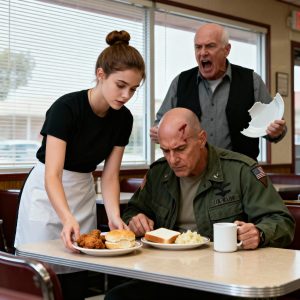I held onto a simple, comforting belief for most of my life: no matter what, my parents would be there if I truly needed them. Were they a little self-absorbed? Sure. Their latest cruise was often a bigger topic than my kids’ milestones. But deep down, I was certain that in a real crisis, they’d come through. That certainty evaporated on a random Tuesday, under the unforgiving fluorescent lights of a hospital corridor.
It began as a dull throb in my side while I was matching tiny socks. I shrugged it off—too much coffee, not enough sleep. But the throb quickly sharpened into a stabbing pain that stole my breath. My husband, Mark, was hundreds of miles away on a work trip. It was just me and our four-year-old twins, Ellie and Sam.
The pain soon became a white-hot fire. A frantic call to my doctor confirmed my fear: get to the ER now. It sounded like appendicitis, and it might be about to burst.
Panic seized me. Surgery meant I’d be gone for hours. My children. Who could take them? My parents lived a mere ten minutes away. They were the obvious choice, the doting grandparents who never missed a chance to post photos with their “favorite grandkids.”
I dialed my mom, my hand slick with sweat against the phone as another cramp twisted my insides.
“Mom,” I choked out, “I have to go to the hospital. It’s bad. Can you please come get the kids?”
A beat of silence, then a long, weary sigh. “Honey, you know we can’t tonight. We have those Elton John tickets. Your aunt is meeting us there—we planned this ages ago.”
For a second, I thought the pain was making me hallucinate. “Mom, I might be going into surgery.”
“I understand, but these were a fortune,” she replied, her tone flat, almost annoyed. “It’s his farewell tour. Can’t you call a sitter? One of your mom-friends?”
“You live ten minutes from me!” I cried, my voice breaking.
She sighed again, as if I were the one being difficult. “You have to see this from our perspective. We can’t be your default for every little crisis. Lately, it feels like you’re always needing something. It’s a lot for us to handle.”
A lot to handle.
I ended the call before the sob in my throat could escape.
Blinded by pain and desperation, I speed-dialed three friends. No one could come. With no other options, I fumbled for an emergency babysitting app, authorized a stranger with my door code, and left a wad of cash on the entry table.
I was slumped against the front door when the sitter found me. She half-carried me to her car and drove me to the ER. The last coherent thought I had before the world went black was a nurse gently asking, “Is there anyone we should call for you?”
“They know,” I whispered into the mask. “They had… prior engagements.”
My appendix had ruptured. The doctor was clear: another hour, and the outcome could have been catastrophic.
I woke up hours later to a phone lit up with missed calls from Mark, who was already racing home. There was nothing. Not a text, not a voicemail from my parents.
Lying in that quiet, beeping room in the middle of the night, a cold, hard clarity settled over me. I saw the last decade with painful precision: the “loan” to bail out my dad’s failing venture, the months my sister “crashed” on our couch rent-free, the countless times I’d quietly paid my parents’ bills after another one of their “financial surprises.”
I’d called it family duty. But family doesn’t abandon you on an ER gurney for a night of “Crocodile Rock.” Family doesn’t make you feel like an inconvenience when you’re scared and alone.
The next morning, from my hospital bed, I called my bank and severed my parents’ access to the account I’d foolishly labeled “Family Emergency.” I called my lawyer and made sure they would never be legal guardians for my children. Then, I sent one final text:
The financial support ends today. Do not contact me. I am choosing to protect my family now.
Silence was their only reply.
Mark was livid when he got home. Not just about the concert, but about the mountain of financial secrets I’d been keeping. “They’ve been using you, Jen,” he said, running a hand through his hair. “And they had the audacity to make you feel guilty for asking for help? It’s over.”
And it was. I blocked their numbers, unfollowed them online, and told my sister that if she wanted to remain in our lives, she’d drop her role as their messenger.
A surprising feeling emerged: relief. It was tinged with grief, but it was undeniably relief.
Two weeks later, I was home, still sore but healing. It was a quiet Saturday. Mark had taken the kids to the zoo to give me some peace.
That’s when the knocking started.
It wasn’t friendly. It was demanding—three sharp taps, then three more. I looked through the peephole.
They were there.
My dad stared at his shoes, hands jammed in his pockets. My mom clutched a brown paper bag, likely containing a peace-offering pastry.
I almost didn’t answer. But a part of me needed to see it through. I opened the door just a crack, my body blocking the entrance.
“Jennifer,” my mother started, her voice syrupy and strained. “We need to clear the air.”
“There’s nothing to clear,” I said, my voice steady.
My father shuffled his feet. “We feel awful, sweetie. It’s just… those tickets were non-refundable, and your aunt—”
I didn’t let him finish. “Don’t. I was in the hospital. You went to a show.”
My mother’s eyes scanned my face, looking for a weakness to exploit. “We thought you’d have cooled down by now. That we could just… fix this.”
A dry, humorless laugh escaped me. “Fix it? You didn’t call. You didn’t come. The only thing that’s ‘broken’ for you is your ATM.”
Her face flushed. “Things are tight, Jennifer. You know that. Your father’s social security doesn’t stretch like it used to. We assumed you’d—”
“You assumed wrong,” I said, my voice firm. “I’m not your backup plan anymore. And I won’t let my children learn that love is conditional.”
My father’s shoulders slumped. My mother’s smile vanished, replaced by a tight line. For a moment, I expected a fight. Instead, she bent down and placed the bag on the welcome mat.
“Well,” she said, her voice cold and final. “We tried.”
They turned and walked back to their car.
I didn’t say a word. I didn’t shed a tear. I simply closed the door, turned the deadbolt, and left their bag on the step without ever looking inside.
Life after them has a different rhythm. It’s calmer. The phone doesn’t ring with urgent requests for money. That silence has given me room to breathe, to pour all that energy into the family that’s actually in the trenches with me.
I thought the severance would leave a gaping wound. But when I think back to that hospital bed, to the crushing silence on my phone, I feel nothing but certainty.
The lesson was brutal, but necessary: family isn’t a title you’re born into. It’s a role you earn by showing up. And when my parents didn’t, I didn’t just survive. I found a strength I never knew I had, and a freedom that was worth every bit of the heartache.





